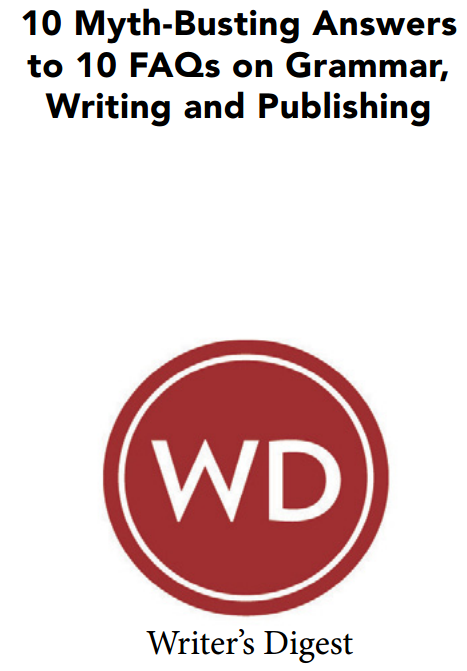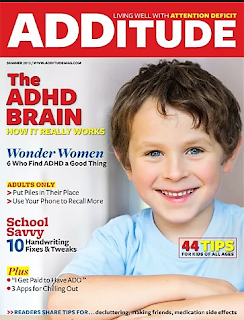Just Write - Overdue Writing
Being out-of-town and caring my son's surgery has taken my time off of writing. I am trying to get my head back in gear. To do this I have been looking at Writer's Digest (WD) and Jeff Goins' Writing Tribe. I wanted to respond to one I found in WD.
Full disclosure: I never bought into any of the myths so I'm really sharing to pat myself in the back because I've known these myths all along. It's always good to be validated.
10 Myth-Busting Answers
to
Can you end a sentence with a preposition? Should you always start a novel with action? There are many so-called writing rules that you hear every day, but not all of them are true.
Here are 10 common writing myths debunked.
1. GUILTY OF IMPROPER PREPOSITIONING?
Q: You can’t end a sentence with a preposition, can you?
A: Actually, you can.
There isn’t a real grammar commandment that says “Thou Shalt Not End Sentences With Prepositions.” Modern grammar books like Garner’s Modern American Usage and Woe Is I have made efforts to dispel this rumor, but it still seems to hang around like one of those annoying e-mail chain letters. Take it from me: Stop wasting your time rewriting sentences such as, Where are you from? into the clunky, From where are you? You’re better off leaving them as is.
2. COMMON SUBJECT/VERB DISAGREEMENT?
Q: The word “none” should always be treated as singular, right?
A: This is a major misconception. “None” can be a singular pronoun if it’s referring to “not one” or “no part,” but it also can be plural when referring to “not any.” None of the apple was eaten. “Apple” is a singular item, so you’d use the singular verb “was.” But: None of the ballplayers were on the team bus after the game. Here, “none” refers to “not any of the ballplayers” just as much as it refers to “not one of the ballplayers,” so it can be plural. Pluralizing it not only makes it a clearer sentence, but also makes it less awkward to read.
3. THE BIG BANG THEORY?
Q: Is it true that the best way to start my novel is with action?
A: The commonly accepted “rule” that you should begin your novel with action has a flaw—and it’s a major one: What good is the action if it isn’t grounded in context that’s important to the story or draws you to the main character? It’s much, much better to start your story with tension, like a character conflict or a character who’s not getting what he wants. This gives the reader a reason to feel connected.
4. CONJUNCTION DYSFUNCTION?
Q: Isn’t it wrong to begin a sentence with “and,” “but” or “because”?
A: Conjunctions such as “and,” “but” and “because” join together clauses, phrases, words or sentences (that’s right, sentences). There’s no definitive rule prohibiting writers from using this great device at the beginning of a sentence; in fact, starting with a preposition can give your sentence a much-needed dramatic effect. And you can take that to the bank.
5. LIMITS TO MY AGENT WISH LIST?
Q: Should I avoid new agents because they might not have any industry contacts yet?
A: Most new agents don’t just fall from the sky and jump into representing authors. The majority of new agents comes from one of two backgrounds: They are either editors who have left publishing houses to become agents, or people who have apprenticed at literary agencies for one or more years. So, typically, when someone becomes an agent, he’s had years of training in the publishing industry and has plenty of contacts. That doesn’t mean a new agent is automatically a fit for everyone’s work, but it also doesn’t mean you should rule out an agent just because he’s “new” to the game.
6. ARTICLES OF CONFUSION?
Q: Is it a strict rule to use “a” before consonants, and “an” before vowels?
A: The real rule is this: You use the article “a” before words that start with a consonant sound and “an” before words that start with a vowel sound. For example: He has a unique point of view on the subject and talked about it for an hour. The “u” in “unique” makes the “y” sound—a consonant sound—so you use “a” as your article, while the “h” in “hour” sounds like it starts with “ow,” a vowel sound.
7. CHOOSING YOUR WORDS TOO WISELY?
Q: Is it true that “since” and “because” should not be used interchangeably?
A: While “because” does imply cause, “since” can imply time or cause. What does that mean? It means that most of the time these words are synonymous and you can use either one. Since my dog is so hairy, I have to get its hair cut regularly. Because my dog is so hairy, I have to get its hair cut regularly. Both of these sentences are correct. The only trap you have to watch out for is when using “since” causes ambiguity. Since we had breakfast, we were filled with energy. This makes you wonder: Were we filled with energy after breakfast, or because of breakfast?
8. CONSPIRACY THEORIES OF REJECTION?
Q: Doesn’t it seem like agents are just looking for excuses to reject work?
A: Actually, the complete opposite is true. Agents don’t want to reject your work; they want to accept it and sell it to any publisher willing to take a chance—after all, that’s how they pay their rent. Agents may tell you that they have rejected work because the writer used poor grammar, or didn’t follow submission guidelines, or shares a name with a grade-school bully whom the agent has never forgiven (all of which make it sound like they are out to get you), but the dirty truth is this: Agents are willing to look past all of that if you have a story that’s worth selling. Grammar can be fixed; a bad story idea can’t.
9. WORD MISUSE?
Q: Isn’t “plethora” just a fancy way of saying “a lot”?
A: The misuse of “plethora” is a pet peeve of mine. The word “plethora” doesn’t mean “a lot.” It means “too many” or “an overabundance.” In the sentence, Many voters feel that there are a plethora of laws that are useless, it shows that some voters believe there are too many useless laws. If you say you own a plethora of baseball hats, you’re not saying you have a lot—you’re saying you believe you have too many for your own good, and it’s time to get rid of a few.
10. THE GOLDEN TICKET OF PUBLISHING?
Q: Come on, seriously: Is there a secret formula to getting published?
A: If there were a magic one-size-fits-all recipe, someone most certainly already would have sold it and would be a multi-bajillionaire by now. But alas, there is no set-in-stone formula to getting published. It stands to reason that the key elements of any publishing formula would include (but would not be limited to): coming up with a great idea, working hard at perfecting it, writing constantly, building your platform and hoping upon hope you get lucky. My experience has been that the last element is just as important as all the rest. Of course, if you do all the rest, you put yourself in the best position to be prepared when luck finds you. *************************************************************************
Brian A. Klems is the online editor of Writer’s Digest and author of the popular gift book Oh Boy, You’re Having a Girl: A Dad’s Survival Guide to Raising Daughters. Follow Brian on Twitter: @BrianKlems Also, for more grammar tips and publishing advice, purchase THE BEGINNING WRITER’S ANSWER BOOK, which is a great addition to your bookshelf! Edited by Jane Friedman, it’s filled with helpful advice but most of all--it has the answers to the questions you’re bound to have. No matter what genre of writing you’re interested in, this book has everything you’re looking for.
Full disclosure: I never bought into any of the myths so I'm really sharing to pat myself in the back because I've known these myths all along. It's always good to be validated.
10 Myth-Busting Answers
to
10 FAQs on Grammar,
Writing and Publishing
by Brian A. Klems
Can you end a sentence with a preposition? Should you always start a novel with action? There are many so-called writing rules that you hear every day, but not all of them are true.
Here are 10 common writing myths debunked.
1. GUILTY OF IMPROPER PREPOSITIONING?
Q: You can’t end a sentence with a preposition, can you?
A: Actually, you can.
There isn’t a real grammar commandment that says “Thou Shalt Not End Sentences With Prepositions.” Modern grammar books like Garner’s Modern American Usage and Woe Is I have made efforts to dispel this rumor, but it still seems to hang around like one of those annoying e-mail chain letters. Take it from me: Stop wasting your time rewriting sentences such as, Where are you from? into the clunky, From where are you? You’re better off leaving them as is.
2. COMMON SUBJECT/VERB DISAGREEMENT?
Q: The word “none” should always be treated as singular, right?
A: This is a major misconception. “None” can be a singular pronoun if it’s referring to “not one” or “no part,” but it also can be plural when referring to “not any.” None of the apple was eaten. “Apple” is a singular item, so you’d use the singular verb “was.” But: None of the ballplayers were on the team bus after the game. Here, “none” refers to “not any of the ballplayers” just as much as it refers to “not one of the ballplayers,” so it can be plural. Pluralizing it not only makes it a clearer sentence, but also makes it less awkward to read.
3. THE BIG BANG THEORY?
Q: Is it true that the best way to start my novel is with action?
A: The commonly accepted “rule” that you should begin your novel with action has a flaw—and it’s a major one: What good is the action if it isn’t grounded in context that’s important to the story or draws you to the main character? It’s much, much better to start your story with tension, like a character conflict or a character who’s not getting what he wants. This gives the reader a reason to feel connected.
4. CONJUNCTION DYSFUNCTION?
Q: Isn’t it wrong to begin a sentence with “and,” “but” or “because”?
A: Conjunctions such as “and,” “but” and “because” join together clauses, phrases, words or sentences (that’s right, sentences). There’s no definitive rule prohibiting writers from using this great device at the beginning of a sentence; in fact, starting with a preposition can give your sentence a much-needed dramatic effect. And you can take that to the bank.
5. LIMITS TO MY AGENT WISH LIST?
Q: Should I avoid new agents because they might not have any industry contacts yet?
A: Most new agents don’t just fall from the sky and jump into representing authors. The majority of new agents comes from one of two backgrounds: They are either editors who have left publishing houses to become agents, or people who have apprenticed at literary agencies for one or more years. So, typically, when someone becomes an agent, he’s had years of training in the publishing industry and has plenty of contacts. That doesn’t mean a new agent is automatically a fit for everyone’s work, but it also doesn’t mean you should rule out an agent just because he’s “new” to the game.
6. ARTICLES OF CONFUSION?
Q: Is it a strict rule to use “a” before consonants, and “an” before vowels?
A: The real rule is this: You use the article “a” before words that start with a consonant sound and “an” before words that start with a vowel sound. For example: He has a unique point of view on the subject and talked about it for an hour. The “u” in “unique” makes the “y” sound—a consonant sound—so you use “a” as your article, while the “h” in “hour” sounds like it starts with “ow,” a vowel sound.
7. CHOOSING YOUR WORDS TOO WISELY?
Q: Is it true that “since” and “because” should not be used interchangeably?
A: While “because” does imply cause, “since” can imply time or cause. What does that mean? It means that most of the time these words are synonymous and you can use either one. Since my dog is so hairy, I have to get its hair cut regularly. Because my dog is so hairy, I have to get its hair cut regularly. Both of these sentences are correct. The only trap you have to watch out for is when using “since” causes ambiguity. Since we had breakfast, we were filled with energy. This makes you wonder: Were we filled with energy after breakfast, or because of breakfast?
8. CONSPIRACY THEORIES OF REJECTION?
Q: Doesn’t it seem like agents are just looking for excuses to reject work?
A: Actually, the complete opposite is true. Agents don’t want to reject your work; they want to accept it and sell it to any publisher willing to take a chance—after all, that’s how they pay their rent. Agents may tell you that they have rejected work because the writer used poor grammar, or didn’t follow submission guidelines, or shares a name with a grade-school bully whom the agent has never forgiven (all of which make it sound like they are out to get you), but the dirty truth is this: Agents are willing to look past all of that if you have a story that’s worth selling. Grammar can be fixed; a bad story idea can’t.
9. WORD MISUSE?
Q: Isn’t “plethora” just a fancy way of saying “a lot”?
A: The misuse of “plethora” is a pet peeve of mine. The word “plethora” doesn’t mean “a lot.” It means “too many” or “an overabundance.” In the sentence, Many voters feel that there are a plethora of laws that are useless, it shows that some voters believe there are too many useless laws. If you say you own a plethora of baseball hats, you’re not saying you have a lot—you’re saying you believe you have too many for your own good, and it’s time to get rid of a few.
10. THE GOLDEN TICKET OF PUBLISHING?
Q: Come on, seriously: Is there a secret formula to getting published?
A: If there were a magic one-size-fits-all recipe, someone most certainly already would have sold it and would be a multi-bajillionaire by now. But alas, there is no set-in-stone formula to getting published. It stands to reason that the key elements of any publishing formula would include (but would not be limited to): coming up with a great idea, working hard at perfecting it, writing constantly, building your platform and hoping upon hope you get lucky. My experience has been that the last element is just as important as all the rest. Of course, if you do all the rest, you put yourself in the best position to be prepared when luck finds you. *************************************************************************
Brian A. Klems is the online editor of Writer’s Digest and author of the popular gift book Oh Boy, You’re Having a Girl: A Dad’s Survival Guide to Raising Daughters. Follow Brian on Twitter: @BrianKlems Also, for more grammar tips and publishing advice, purchase THE BEGINNING WRITER’S ANSWER BOOK, which is a great addition to your bookshelf! Edited by Jane Friedman, it’s filled with helpful advice but most of all--it has the answers to the questions you’re bound to have. No matter what genre of writing you’re interested in, this book has everything you’re looking for.



Comments
Post a Comment